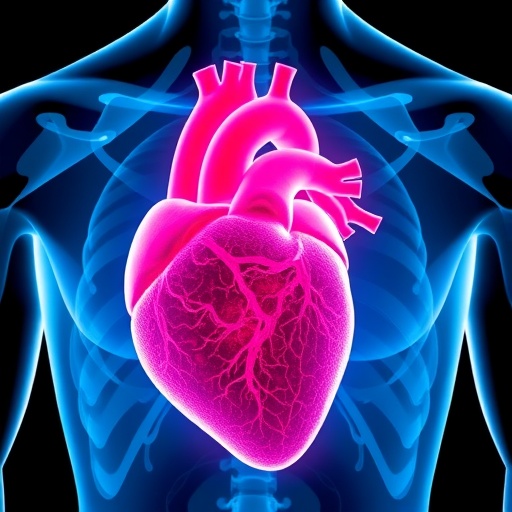In a groundbreaking study poised to reshape our understanding of diet and cardiovascular health, researchers from the Institute for Biomedical Sciences at Georgia State University have demonstrated that a plant-based diet can both prevent and reverse coronary microvascular dysfunction (CMD) in hypertensive rat models. CMD, a condition characterized by damage to the heart’s microvasculature leading to impaired blood flow regulation, represents a significant clinical challenge due to its prevalence, especially among hypertensive patients, and its persistence despite current therapeutic efforts.
The research, published in the Journal of the American Heart Association, involved female spontaneously hypertensive rats subjected to either a refined control diet devoid of plant foods or a nutrient-matched plant-based diet rich in fruits, vegetables, nuts, and legumes. Over six months, the investigation focused not only on the preventative capacity of this diet but remarkably, also its restorative effects on established CMD. This dual approach provides vital insights into dietary interventions as a potentially powerful tool in cardiovascular disease management.
CMD’s pathophysiology implicates the dysfunction of endothelial cells — the critical regulators of vascular tone in coronary microvessels. Normally, these cells facilitate vasodilation, ensuring adequate myocardial perfusion especially under stress. However, hypertension induces oxidative stress and inflammation, leading to endothelial damage. Such damage results in improper vasoconstriction and inadequate blood flow, manifesting clinically as chest pain and contributing to heart failure risk. Notably, CMD presents with a higher severity in women and correlates with increased hospitalization rates, underscoring an urgent need for more effective therapies.
Traditional pharmacological treatments for CMD yield limited success, often failing to adequately restore microvascular function. This shortcoming prompted the Georgia State team to investigate non-pharmacological alternatives targeting the underlying vascular cell dysfunction. Rooted in the hypothesis that antioxidants found abundantly in plant-based foods may counteract oxidative vascular damage, the study tested a diet comprising 28% plant-based components—a composition analogous to a human diet featuring black beans, red bell peppers, Brussels sprouts, lemons, sweet potatoes, walnuts, and blueberries.
One of the study’s most compelling findings was that the plant-based diet improved coronary flow reserve—a clinical measure of microvascular function—even while systemic hypertension remained unabated. This suggests that vascular endothelial health can be selectively enhanced independent of blood pressure control. MRI-based assessments of myocardial blood flow corroborated these improvements, revealing restored perfusion correlating with improved endothelial responsiveness.
Further cellular investigations isolated blood vessel endothelial cells from heart tissues to delineate the mechanistic underpinnings of this dietary intervention. Results indicated that the antioxidant-rich diet mitigated markers of oxidative damage and inflammation within these cells, enhancing their ability to mediate vasodilation. Moreover, histological analyses highlighted reduced tissue injury and fibrosis, implicating improved vascular integrity as a central mediator of the observed functional recovery.
By switching a subset of rats from the control to the plant-based diet after CMD was established, researchers demonstrated that dietary modification not only prevents but also partially reverses microvascular disease progression. This finding has profound clinical implications, as it provides a potential low-cost, low-risk therapeutic strategy to halt and regress CMD pathology, a feature rarely achieved with current therapies.
The study’s translation to human health is particularly promising. Given the diet’s similarity to feasible human dietary patterns rich in whole, plant-based foods, these findings support initiating clinical trials to evaluate whether corresponding dietary regimens might similarly benefit patients with CMD. Such trials could pioneer a paradigm shift in cardiovascular disease prevention and management, especially for those with hypertension who remain at risk despite pharmacologic control.
Importantly, this research also sheds light on the sex-specific vulnerability of CMD, as women disproportionately suffer from this microvascular disorder. Future investigations could explore whether plant-based diets confer differential benefits across sexes and dissect the molecular pathways implicated in CMD pathogenesis unique to female physiology.
The robust methodology employed—including prolonged dietary exposure, advanced imaging modalities, and cellular-level analysis—provides rigorous validation of the diet’s effects. This integrative approach reinforces the validity and applicability of findings, ensuring that they resonate beyond animal models to inform clinical strategies.
While the study underscores the antioxidant potential of plant-based foods as a key factor, it also opens avenues for investigating other components such as fiber, micronutrients, and phytochemicals that may synergistically influence vascular health. Understanding the composite effect of these nutrients could refine dietary guidelines further, tailoring interventions to optimize cardiovascular outcomes.
Overall, the demonstrated ability of a thoughtfully composed plant-based diet to counteract and even reverse hypertension-induced coronary microvascular dysfunction marks a pivotal advancement in cardiovascular research. It reaffirms the vital connection between nutrition and heart health and offers a tangible, actionable pathway to mitigate a disease that disproportionately burdens millions worldwide.
This pioneering work lays essential groundwork for future clinical trials and mechanistic studies aimed at dissecting the complexities of diet-induced vascular repair. By illuminating the substantial reparative capacity of plant-derived nutrients, the study empowers patients and healthcare providers alike to reconsider dietary prescriptions as fundamental components of cardiovascular disease management.
Subject of Research: Animals
Article Title: Prevention and Reversal of Hypertension‐Induced Coronary Microvascular Dysfunction by a Plant‐Based Diet
News Publication Date: 11-Nov-2025
Web References: https://www.ahajournals.org/doi/full/10.1161/JAHA.125.045515
References: Najjar, R.S., et al. (2025). Prevention and Reversal of Hypertension-Induced Coronary Microvascular Dysfunction by a Plant-Based Diet. Journal of the American Heart Association. DOI: 10.1161/JAHA.125.045515
Image Credits: Georgia State University
Keywords: Heart disease, Dietetics
Tags: animal study on diet and heart healthcardiovascular health researchcoronary microvascular dysfunction preventiondietary interventions for CMDendothelial cell dysfunctionfruits vegetables nuts legumes diethypertension management strategiesJournal of the American Heart Associationoxidative stress and inflammationplant-based diet benefitsreverse hypertensive heart diseasevascular health and nutrition





